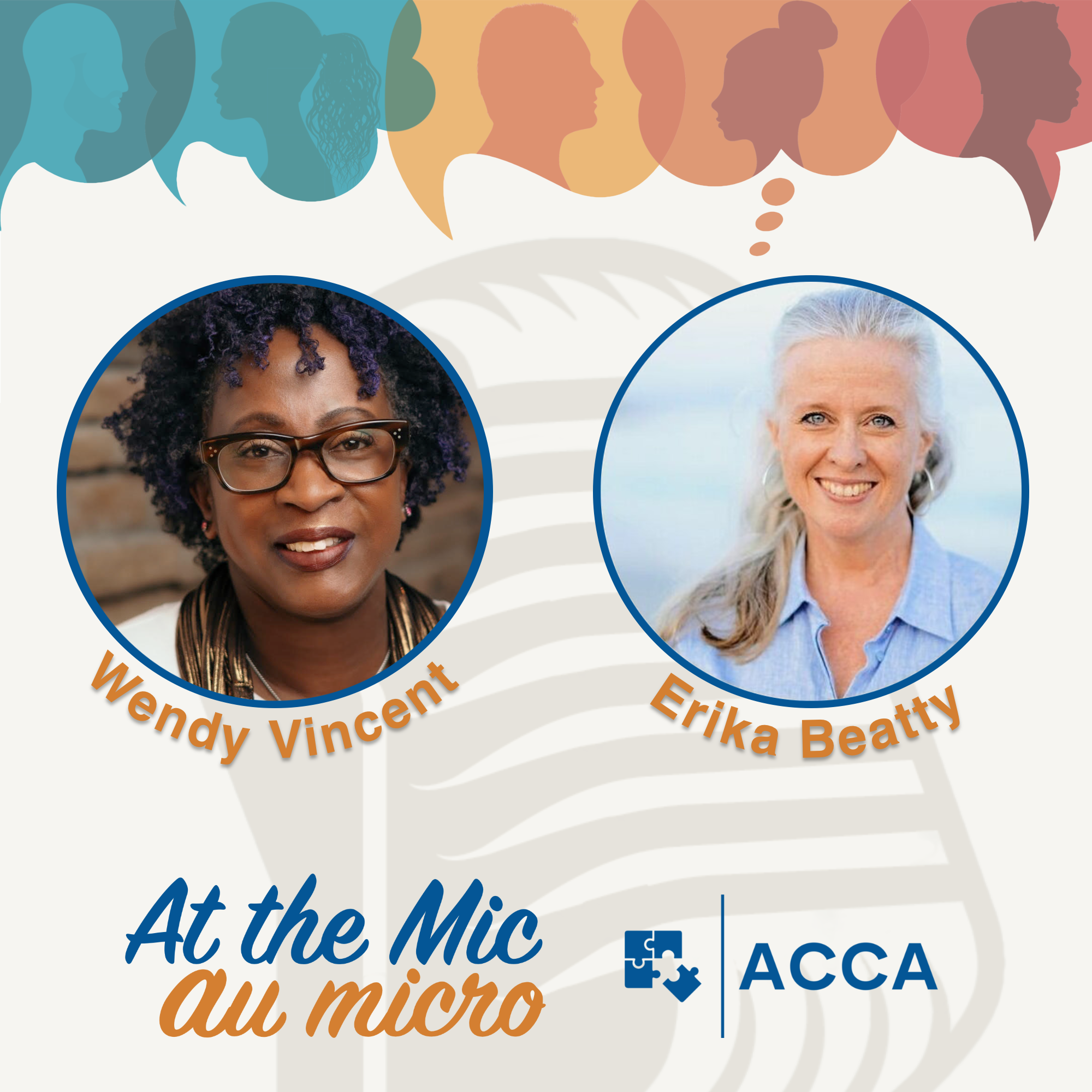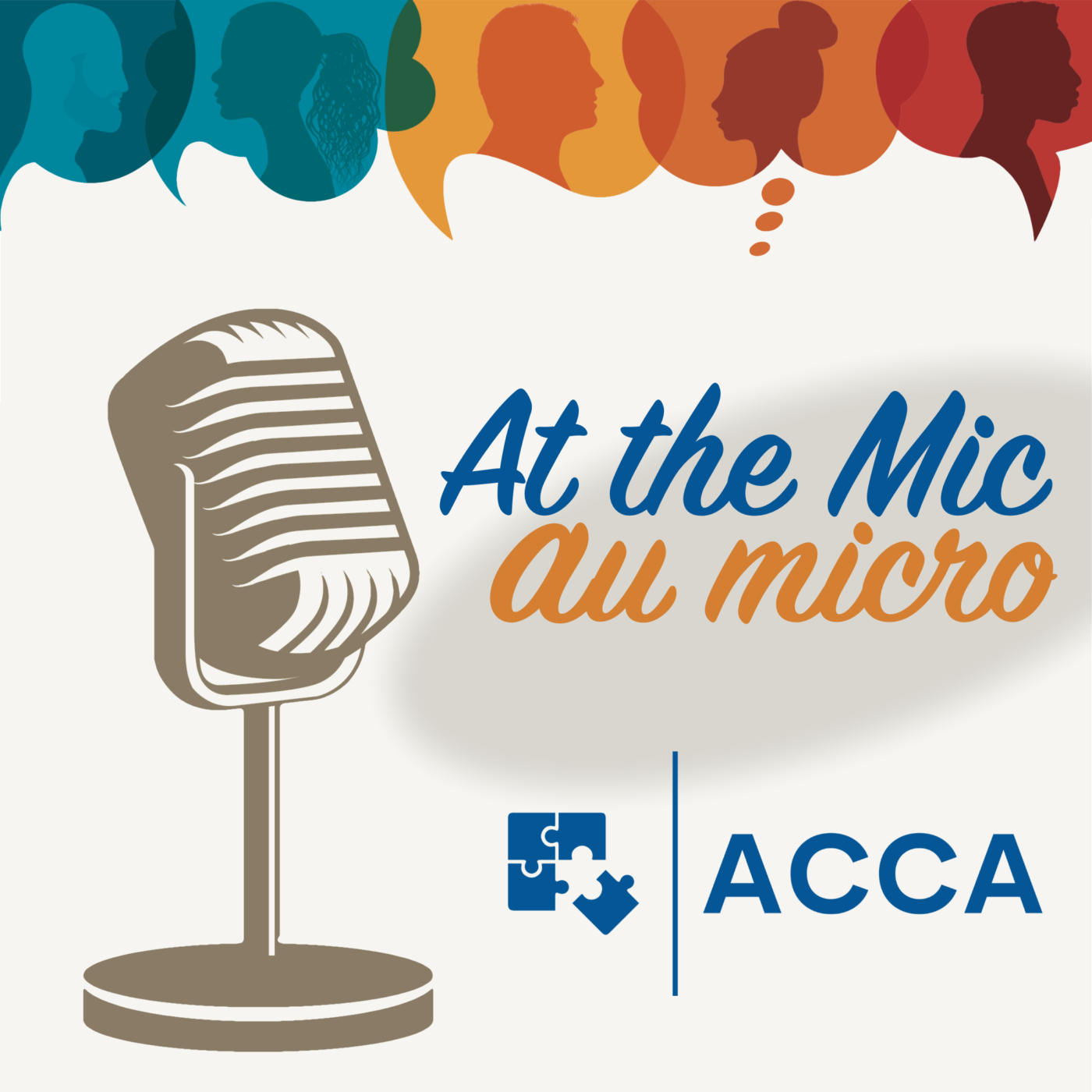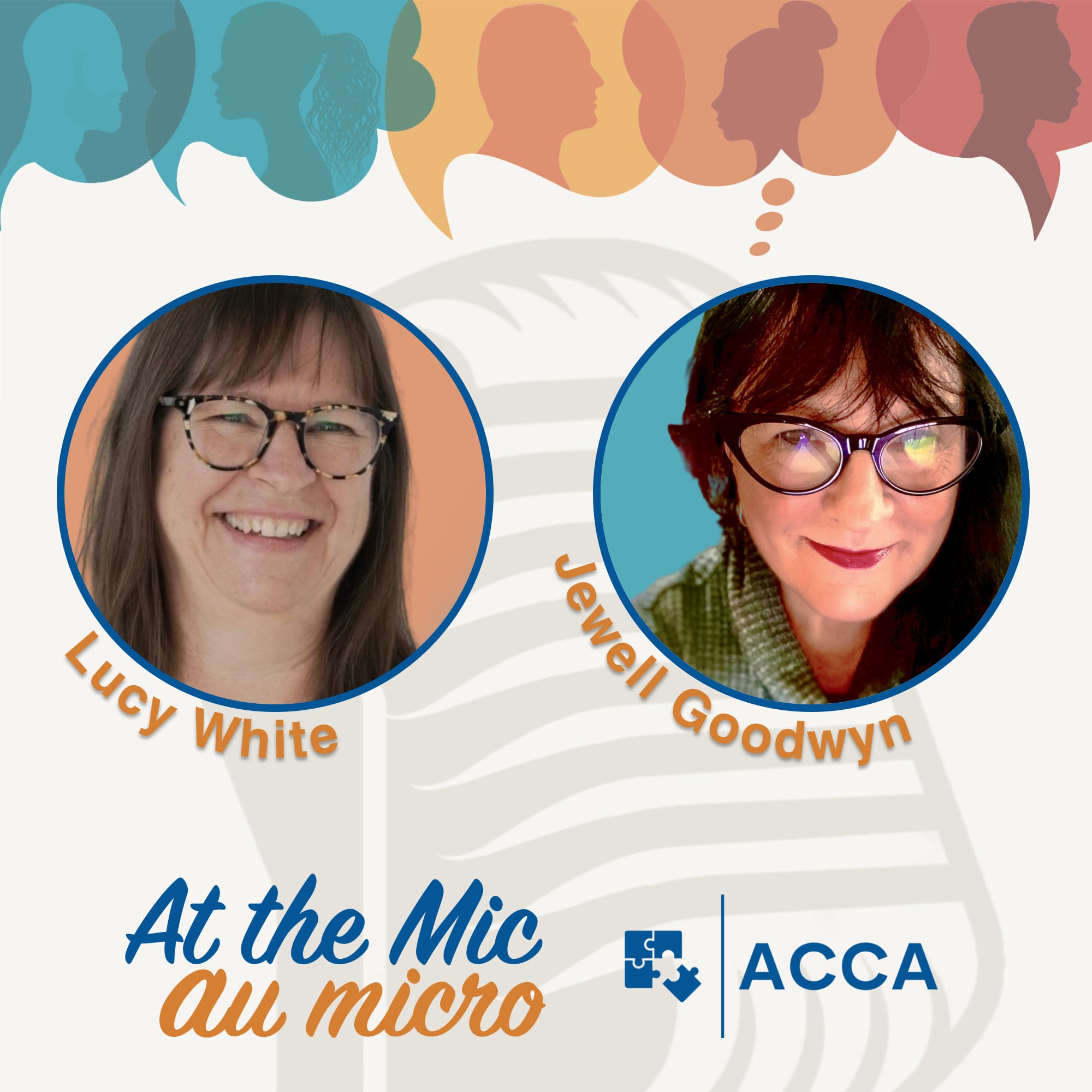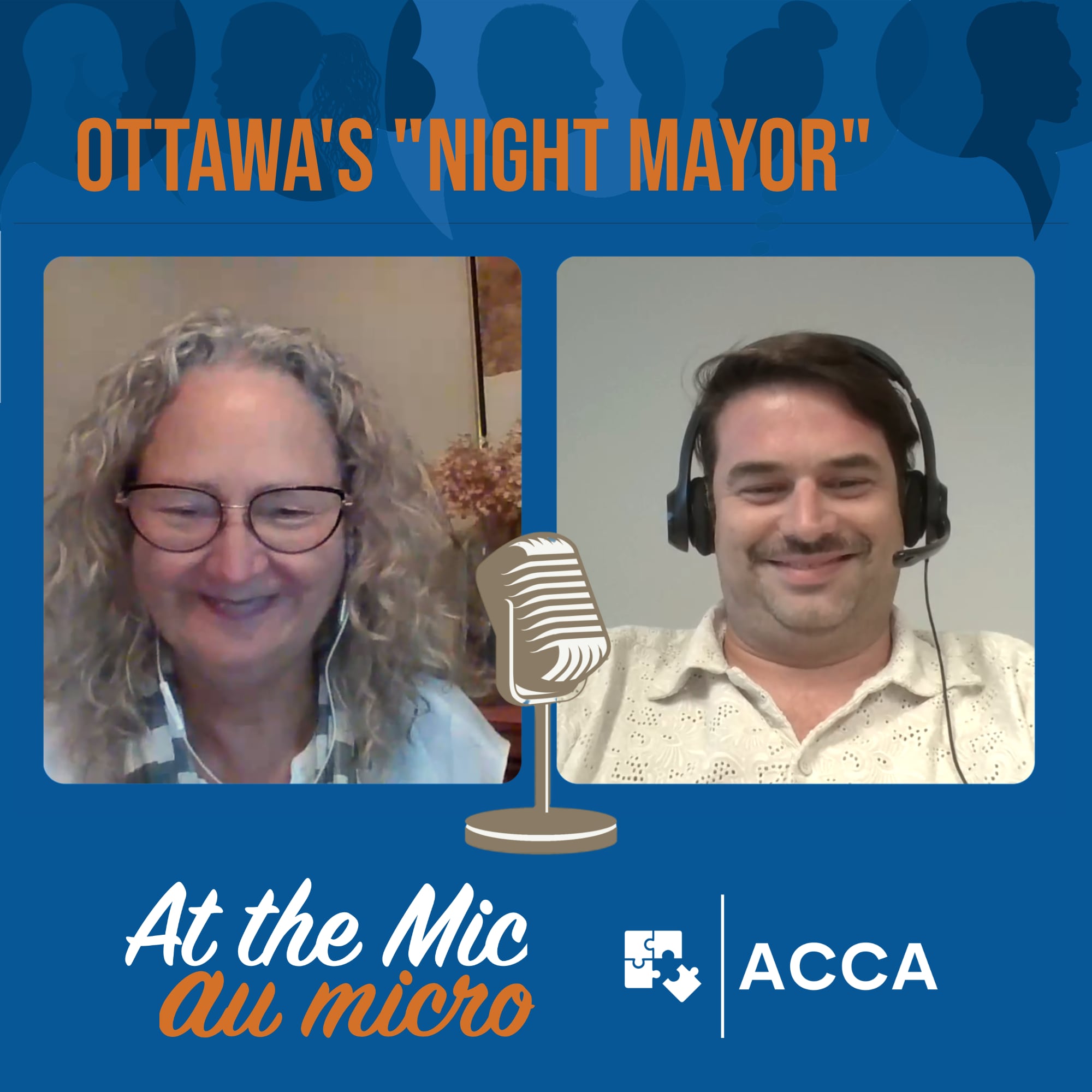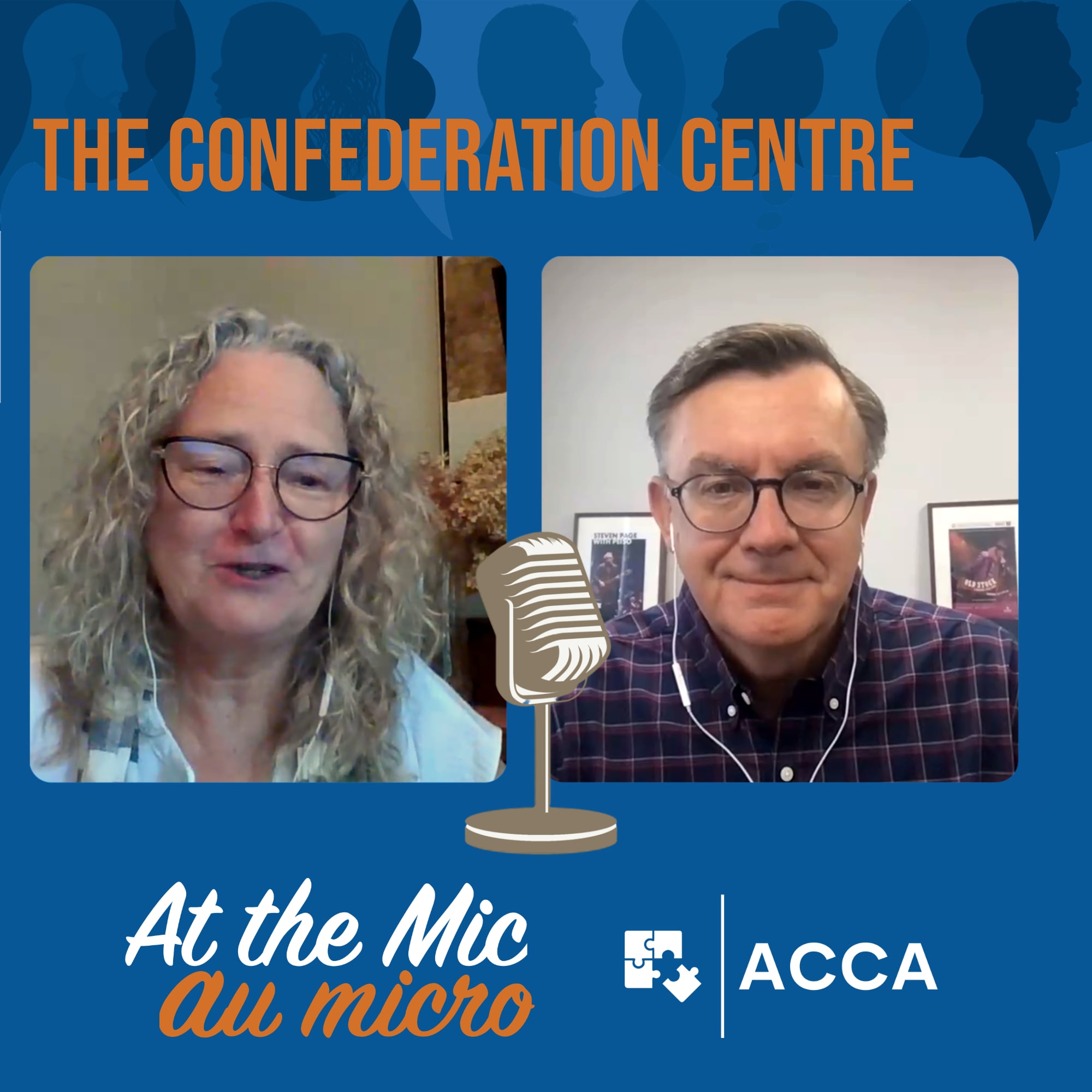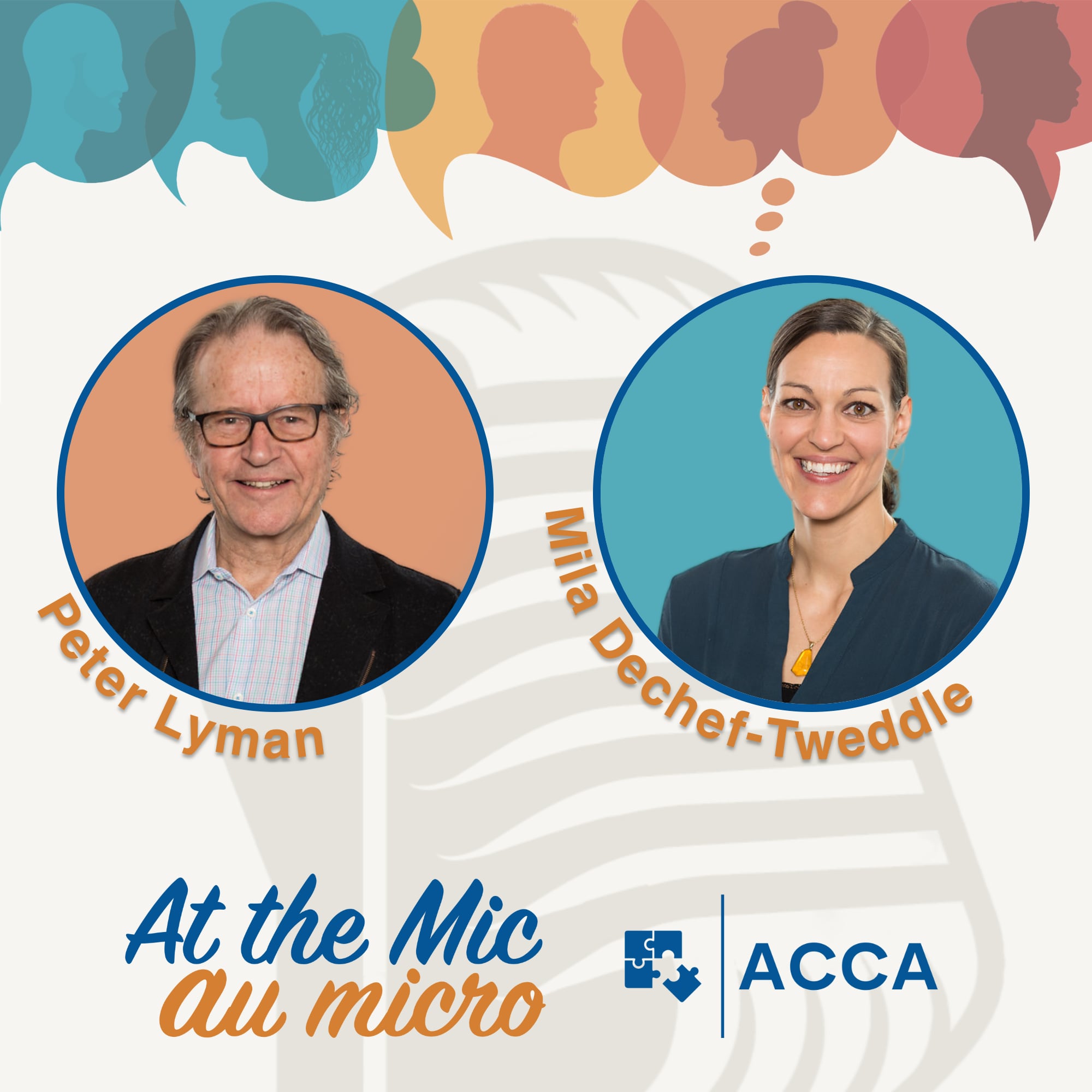[00:00:00] Victoria: Hello, and welcome to the inaugural episode of At The Mic, a podcast brought to you by Arts Consultants Canada, l’Association des consultants canadiens en arts. In this very first edition of At the Mic, we bring you a conversation on meaningful approaches to putting diversity, equity, and inclusion practices into action with guest Wendy Vincent and moderator, Erika Beatty.
Wendy is a Toronto based PR and media relations expert with specialization and equity based strategic communications delivery As a seasoned professional with specialties in media relations, communications, and events planning, Wendy’s expertise spans the creative industries as well as politics. Her delivery of equity and anti-black racism work is informed by mindfulness and her lived experience as a black woman.
In the cultural sector, Wendy has led PR campaigns for clients such as AFROFEST, Neo Centre for the Arts, ATRA Toronto Planet and Focus Film Festival among others, and her past employers include the Royal Ontario Museum, Harborfront Center, and the Toronto Caribbean Carnival.
Halifax based Erika Beatty is known for strategic integration of new ideas and technology. Creating collaborative partnerships and teams that excel and developing organizations with good governance, sound strategy, and sustainable finances. Following a 20-year career as a chief executive of Canadian Symphony orchestras, she shifted to supporting content creation and the creative film industry.
And now here are Wendy Vincent and Erika Beaty.
[00:01:45] Erika: My name’s Erika Beatty, I’m the managing director of The Arts Firm. I spent 20 years as a leader or CEO in the performing arts in Canada, mainly with orchestras. I also was film commissioner for the province of Nova Scotia and, did some work as a documentary producer and co-producer. In 2018, I founded The Arts Firm, mainly as a chance to work with others, I’m so used to team projects and, Wendy, I’ll be interested to hear your perspective, or your experience as a consultant, but so much of what arts consultants seem to do in in Canada seem to be as solitary practitioners. So, The Arts Firm is really a chance to bring, team members with different expertise, always with deep experience in the arts, but also expertise outside of the arts in order to work in teams together.
So, Wendy and I actually met each other through ACCA. we had a number of conversations. It was a real pleasure to watch her work and to listen to her think. And, I’ve really been doing my own work, in unlearning as well as learning in this area, this topic that we’re going to be talking about today, which is diversity, equity and inclusion.
[00:03:05] Wendy: Thank you. So, a bit about myself and my background. Again, thank you so much, Erika for joining. I appreciate you. Most recently from, well, currently partner director at Konvo Media. We are a marketing and PR agency. So I have a business partner who is responsible for all the marketing and the digital content, and I’m responsible for all of the communications plans that we deliver for our clients, many of whom are in the arts space. So, the likes of Planet in Focus Film Festival, AFROFEST. You know, a lot of big brands, ACTRA, Toronto, we’ve done PR for their awards for two years in a row. Prior to joining Konvo Media, I worked at the ROM, the Royal Ontario Museum for six and a half years, in-house as a bilingual publicist. I’ve worked at the Canadian Broadcasting Corporation, the CBC. I was there as a communications officer for 10 years. And in between that I’ve done a lot of in-house as well as agency work, and consulting work, with respect to delivering communications plans for clients. Again, mostly, but not exclusively in the art space.
[00:04:26] Erika: Well, ACCA is so lucky to have you as a member and, as a member, I really appreciated discovering you through their member website. And we’ve been talking for about a year now. Because we’d already started our relationship it meant that, I was in about a year and a half into a big project with the client where it became really obvious that we needed DEI work and we needed a consultant with your background and experience. So, I just, you know, I appreciate you. Thank you so much, when I gave you that call saying, can you, can you, do you have time and is this interesting to you and, you came on board and you helped us to really quickly identify some key things to pivot and to make a shift and, delivered that part of a complicated piece of work really, really well. I want to thank you for that,
[00:05:15] Wendy: Oh, thank you.
[00:05:16] Erika: Tell me a bit, you know, your background in the arts is as an arts worker, as a volunteer, as a board member and now, really, as a consultant. Do you enjoy being a consultant and why are you a consultant?
[00:05:31] Wendy: Thank you. So, I show up as a consultant based on my lived experience as a black woman you know, having worked in the arts and in the creative industries for a while. A defining role that I had, that’s not on my resume, because it’s so far back, but I spent two years working at Toronto Caribbean Carnival or Caribana, which is North America’s largest cultural festival. And it is what it is. It is North America’s largest cultural festival, but. you know, people who work at Carnival and at Caribana as black and Caribbean people in Canada may not necessarily think about the gravitas of a statement like that, right? And this is a festival, this is a gathering that fuels the Toronto economy in a really profound way. And, you know, we’re talking about travel, we’re talking about tourism. So, there’s all these sort of pieces that, since 1967, Caribana has contributed to the city of Toronto, with the exception of the, the years set aside for Covid.
But you know, all that to say, I do enjoy being an arts worker. I do enjoy being a cultural worker. I do enjoy being a consultant because my lived experience and how I show up, how I have gleaned knowledge and information working at these big brands and these big institutions. I’m happy to be able to now transfer that to a different variety and a different type of client.
[00:07:23] Erika: Your career is national and hyper-local at the same time, when we think specifically about DEI and what diversity means in that context, what is DEI and can we talk about that a little bit? Why representation is so important?
[00:07:40] Wendy: Absolutely. Thank you. Yes. So, I’m going to grab a definition of DEI that I’ve taken from Google. DEI is a term used to describe policies and programs that promote the representation and participation of different groups of individuals, including different ages, races, ethnicities, abilities and disabilities, genders, religions, cultures and sexual orientations. So, there’s a huge, huge, huge population and populations and groups of people who are under that sort of larger umbrella. And when I look at that, of course, for me, representation does stand out and I’m aware that I’m not over speaking for other groups. I’m showing up to this conversation representing my lived experience as a black woman. So, representation is about access, is about who is at the table and how did they get there.
[00:08:55] Erika: And when we think about the representation that exists in most of the large arts organizations across the country anyway, especially those that have, are most established and have been around for decades, how must arts consultants, prepare ourselves to incorporate DEI into our work? How do we take representation to heart and how do we change our practice so that our DEI work is authentic?
[00:09:24] Wendy: Well, you’ve said it. Taking it to heart and authenticity, So, the practice of tokenism and virtual signaling, that’s all harmful, that those are harms onto themselves. So, organizations and individuals need to be ready to do the work and do it humbly and be ready to learn and unlearn and listen.
And as that process begins of resetting your organization, do that work to look at how accessible are your entry points really. Who are you speaking to? How do you speak to them? How do you reach people? Are you reaching people in these groups where they are? Are you willing to do the work to reach people where they are and engage people and bring them into your folds and have a look at what’s harmful? And ways that your particular organization may organically be harmful to somebody.
[00:10:40] Erika: When we think about organizations that may not even be aware that they are causing harm, what’s some of the work that they need to do in order to make sure that they are carrying at least an equal amount of the burden because people who typically work in DEI spaces, they’re tired.
[00:11:02] Wendy: Yeah, it is. It’s a lot of emotional labor and it’s a lot of heavy lifting and it’s heavy lifting that we’ve been in different ways all along, but has not been acknowledged. And has not been acknowledged from a remuneration and an HR perspective, from a payroll department perspective. It has not been valued the way that it is today, and that’s profoundly sad because these changes are happening and the idea of looking at making change has come at a very heavy cost. And I’m referring to what’s been happening in the news cycle in the past two plus years with respect to all of those horrible incidents of harm and racism. And that has, caused a lot of sectors, including the arts to take a pause and some organizations have been called out. And that calling out, again, speaks to, taking the time to acknowledge and be humble and be ready to listen, unlearn and make space and value the work of racialized creatives, racialized art workers, racialized consultants.
[00:12:29] Erika: How would you help a client to prepare for DEI work in a way that isn’t seen as just being a check the box exercise, and something that acknowledges and prepares for the, the unlearning that needs to be done to get over white fragility.
[00:12:52] Wendy: Yeah. There’s a, there’s a lot there and you phrased white fragility. It’s, a term that’s in the domain. There’s a book that’s been written about white fragility. I’ve experienced it with clients who have come to me in tears. So, this is very real, right? It’s very real. And the benefit of acknowledging your privilege, the benefit of acknowledging that you have work to do is setting in for that long game and coming out at the end with an authentic, a representative and a safe space for racialized people, for people with disabilities, for people of different sexual orientation. And there’s a lot of work that has been done on the back end for years about the benefits of having diverse voices, not just diverse faces, but diverse voices at the table. So, it’s not short work, it’s not easy work, but the, the wins are. It’s a reset. It’s a reset opportunity.
[00:14:14] Erika: When you think about an organization that has done the DEI work and done it right, what are some of the outcomes that you see that are really compelling reasons why this work must be done?
[00:14:26] Wendy: This is where that reset is, this is where it can be a defining moment in an organization. That you have an organization has done the work to press pause and look inside at their systemics, at their barriers, at their access and their entry points, and lift themselves up, lift themselves up by making a safe space for different voices.
We have a client, a past project who their leaders talked about how they are able to move and meet clients quicker and they’re able to meet different clients, right? So, people who’ve been left behind are now part of the fold and part of their output. And this is, just been a reset, a defining reset for these organizations. So, know, whether it’s in the, the art space, whether it’s in, even healthcare, the benefits are, just manyfold.
There are just so many benefits to having groups who were left behind as part of your fold and helping to bring your organization, to lift your organization to the next level because you’ve taken the decision to be inclusive and to be transparent and to be accessible. It’s about having and valuing different voices.
[00:16:01] Erika: What I’ve heard you say is, it’s the responsibility of the organization to lift itself up. And, what I’m also hearing is a consistent theme about recentering and refocusing and a recognition that the beauty of having, a whole authentic and, solid centre to your vision and your organization. So, I’ve been in this field since the early nineties and at the beginning, there was a lot of focus on Canadian content, important Canadian voices, Canadian content. Then there was talk about education and building out the audiences by reaching younger people. Honestly, because in a lot of provinces, they’d cut back on arts education and so the arts organizations need to fill that gap.
[00:16:55] Wendy: Yes.
[00:16:56] Erika: Then there was a conversation about outreach, but outreach is not DEI. And what I’m hearing you say is that it’s the organizations that need to lift themselves. It’s not about the organizations reaching out to the community to help reach underserved or underrepresented or diverse communities up. That’s not what it’s about. This is about the organizations being short and needing to fix themselves.
[00:17:26] Wendy: It absolutely is. Thank you. Yes. It’s internal work as well. And when that internal work is sound that’s when the outreach can compliment the mandate work, but the onus and the heavy lifting and the larger holistic process is about internal work. We talk about systemics and systemic biases those are nurtured internally and that’s how organizations show up in the community is when they have those shortcomings and that impacts their capacity for authentic outreach. So absolutely its internal work.
[00:18:20] Erika: What is it that consultants need to do to be ready to do this work? What is the work that clients need to do internally in order to be ready to do this work? We had a recent, very positive experience, it was hard work, but , I was just so proud of the work that everybody did. What were some of the elements that were in place for that project that you saw that gave you hope that we could succeed?
[00:18:49] Wendy: The main thing was the listening, the fact that the organization was willing to listen, was re not willing, was ready to listen, was ready to unlearn and to learn about their specific sector, but from a racialized lived experience. So that they were valuing the professional capacity of these racialized creatives in a way that they hadn’t been heard before. in a way that they, the organization itself had not gone to the lengths to welcome their voices before.
[00:19:29] Erika: So who’s on the Board.
[00:19:30] Wendy: Yeah, governance is huge.
[00:19:32] Erika: Who’s on the steering committee?
[00:19:33] Wendy: Yeah. Governance and what expertise you’re looking for. Why are you looking for specific expertise and who has the expertise that you’re looking for? And you know, maybe looking at someone who’s further afield, right? Who has the skillset, but in a different way. So, I’m thinking of a client that we worked with at Konvo who are doing a lot of governance work because they ended up with a board that was exclusively Bay Street and that’s great. You know, they’ve got deep, deep pockets butwhat other currency is a value to that Board? Is it just gift? Is it just donor? Is there knowledge, trust? Is there lived experience that racialized people can contribute to your board and have that contribution be valued just as much as those who can, fill a, a room for a ball or a gala?
[00:20:45] Erika: So, the wealth of knowledge, that’s accumulated over generations that has an equal weight as the wealth of dollars that’s accumulated over generations,
[00:20:56] Wendy: Yeah. And you know, the reason the organization had brought me on board is because, yeah, they were failing from an equity perspective. They were failing from a representation perspective. And so ask yourselves those hard questions. Your clients are all racialized people, how are you meeting them? How are you meeting their needs other than financially?
[00:21:19] Erika: And that comes back full circle to your thoughts on representation.
[00:21:23] Wendy: Yeah. Equal value. Lived experience, equal value. Absolutely. And there’s, you know, just other conversations about empathy these are massively important and just as equally important.
[00:21:38] Erika: And recognition that people who have suffered harm are triggered
[00:21:44] Wendy: Yep.
[00:21:45] Erika: And need space and confidence and trust
[00:21:48] Wendy: Absolutely. That heavy lifting, that emotional labor it can be retriggering when you’re, when you’re hearing from people When I’m in the listening seat. Absolutely. Hearing about harm and how, whether it is staff or some other stakeholder. Absolutely. We need time. but just as important as that time is that that validation, that value that’s added and acknowledged for our time and for that heavy lifting.
[00:22:22] Erika: We could continue to talk and that would be me taking advantage of your time because I’m the one that’s doing all the learning here. So, thank you. There’s so much information that is that you have gathered, We’re going to consolidate them and, and, and put them together into show notes.
At the same time, there’s so much that’s changing every day.
[00:22:48] Wendy: Mm-hmm.
[00:22:49] Erika: So my hope is that ACCA will be able to collect comments and feedback. So, anything that we’ve missed or anything that’s developed since this podcast was recorded, I’m hoping we’ll be able to be added to a resource somewhere.
[00:23:05] Wendy: Absolutely. And there are so many talented and wise DEI experts in Canada, I’m thinking of people like Dr. Afu Cooper, who’s in Halifax. I’m thinking of the people who run the indigenous screen office, the people who run the black screen office, the people who started Advance and Breaking Down Racial Barriers. There’s so many amazing trail blazing people who are doing this work on a regular basis. And although Advance is new and Breaking Down, Racial Barriers are new it’s comprised of you who’ve been doing the work for years and they have risen to the news cycle and the trauma and the harm that’s happened, but they’ve been doing the work for years. So absolutely kudos to, to the, to the field of experts who are readily available. I’m just here to hopefully, and hopefully share who they are.
[00:24:15] Erika: Is there any challenge or is there any sort of big mission goal that you would like ACCA to embrace in the near future?
[00:24:26] Wendy: I would say equity, solidarity.
We see it with our clients at Konvo and we see it across the arts in the creative space. So, Planet in Focus Film Festival, they’ve got an, their equity solidarity statement upfront on their, their, you know, homepage for the festival. And that cascades into entry points for the organization and it also is reflected in their programming and what they have curated for the festival and how they acknowledge racialized filmmakers who are in the climate space. So, yeah, absolutely.
Think about having a statement.
It’s acknowledging racialized creatives. It’s acknowledging settler culture in Canada and it’s acknowledging the work that still needs to be done. So, it’s, those three, main pieces I absolutely am aligned with not just having an equity statement, but ensuring that it, it’s validated through your given output that’s where accountability comes in. And ultimately this work is not going to be valid unless there is accountability. So that’s where, the humility, that’s where the rubber hits the road with the humility. Cuz you can show the work and you can talk about the work and you can show how you intend to do the work but unless there’s actual results and accountability, then it’s just lip service. It’s just talk and it’s just as harmful as all the prior work.
And the news cycle, the killing of George Floyd, the remains of these indigenous children, There’s no turning back from that.
This is where the rubber meets the road and all of the bells and whistles and the window dressing, and the virtues signaling and the heart, the, the tokenism, which is all very harmful, everything rests with accountability.
[00:26:54] Erika: And representation.
[00:26:56] Wendy: Yeah.
[00:26:58] Erika: I want to thank again ACCA for having a membership directory where I could find you. And I want to thank you for being a member of a ACCA so that I could discover you. And I really hope for the organization is that the work it does in the next few years, you won’t be the only one or the only one of two or the only one of three. I hope the next time I go onto the ACCA membership list, that we are equally represented. I really look forward to that.
[00:27:31] Wendy: I completely cosign that. I’m completely aligned with that. Absolutely. This is access, this is opportunity as well, and I appreciate you for, for meeting. And meeting my conversation, this is important work,
[00:27:50] Erika: Well, thank you for inviting me. And thank you to ACCA for inviting us. And here’s to many more future partnerships and projects and good work in the future.
[00:28:04] Wendy: Absolutely. Thank you.
[00:28:06] Erika: Thank you.
[00:28:11] Victoria: And that wraps up our first edition of At the Mic, a podcast of Arts Consultants Canada. For information on ACCA and our members, please check us out online artsconsultants.ca and to send us feedback or questions on anything you hear in this podcast series you can email us at
[email protected].
And remember to check out our show notes for links mentioned during the program, as well as transcriptions in both official languages. Thank you so much for joining us on At the Mic. Remember to subscribe to this podcast at Apple Podcasts, Google Podcasts, Spotify, or wherever you find your favourite podcasts.
Until next time, thanks for listening.
